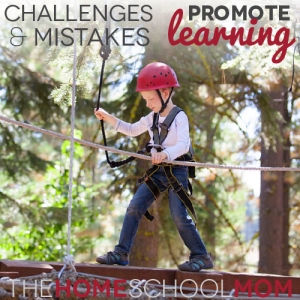
Sometimes children are accused of "looking for trouble" when they simply yearn to vanquish dragons of their own making. A child's desire to challenge him- or herself is at times as unrelenting as physical growth.
As adults we do this in our own way. If we don't have enticing challenges, we may develop a state of mental friction to compensate. It seems to be a very human trait to clutter up our days with trouble if we have no more engaging prospects. We worry, rehash old issues, overreact, or find complications where there may be none. As the roots of a plant become more tightly entangled once they are pot bound, an individual without the freedom to take on greater challenges often gets caught up in the same confining struggles.
One thing we can learn from children is the way they are attracted to dilemmas that help them learn and grow. Children who are nurtured in a healthy, free range learning environment are invigorated by the challenges they seek out. They expand their own frontiers on a comfortable, self-regulating timetable. Perhaps people of all ages define themselves, in part, through the challenges they take on and the way they resolve those challenges.
Oftentimes we deprive children of normal day-to-day challenges because of our own time constraints. As adults we are often distracted and focused on moving forward. It takes considerable tolerance to keep from stepping in and doing for children what will take them much longer to do for themselves, such as solving problems, making choices, completing tasks, and accepting the consequences. But when we recognize that even these small challenges are catalysts for growth, it is easier for us to step back and let children face them as they occur. These are normal stressors. Dealing with them gives children the critical experiences that lead to self-reliance.
So much about today's "managed childhood" has developed in order to prevent young people from making mistakes. We think we know the prescription for success, but as we've seen, a one-size-fits-all approach doesn't allow individuals to thrive. It also denies them the very human right to learn in the way best for them and to listen to the callings that prompt them. The "right way" to proceed in our culture usually means health, popularity, good grades, attractiveness, college degree, career, marriage, mortgage, and so on. We've created these societal expectations largely to cushion our youth from mistakes. But error is inevitable even if we avoid all risks. That narrow, preordained path is anathema to genuine experience. Setting rigid standards for children sends a message. It says to them that failure is the worst outcome and that our acceptance is conditional.
What we might do instead is recognize that courage is required to go one's own way, that mistakes are inevitable, and that the outcome is authenticity. The real challenge lies in accepting each person's possibilities. That's how each of us proceeds when we do what we can with what we have in order to live our lives fully. The path not taken may be the journey regretted forever. That's why we need to honor mistakes as important passages in our lives too. They help us face the next challenge with a wry smile and new determination, knowing another lesson has been learned.
Excerpt from Free Range Learning: How Homeschooling Changes Everything.



 Laura Grace Weldon is the author of Free Range Learning: How Homeschooling Changes Everything, a resource guide for raising life-long learners and also a collection of poetry titled Tending. She writes about learning, sustainability, and hopeful living for GeekMom, Mothering, and her blog. She lives with her family on Bit of Earth Farm where they raise cows, chickens, honeybees, and the occasional wild scheme. She's slow at work on her next book, Subversive Cooking, and recently published Blackbird, a book of poetry. Visit
Laura Grace Weldon is the author of Free Range Learning: How Homeschooling Changes Everything, a resource guide for raising life-long learners and also a collection of poetry titled Tending. She writes about learning, sustainability, and hopeful living for GeekMom, Mothering, and her blog. She lives with her family on Bit of Earth Farm where they raise cows, chickens, honeybees, and the occasional wild scheme. She's slow at work on her next book, Subversive Cooking, and recently published Blackbird, a book of poetry. Visit
Leave a Reply